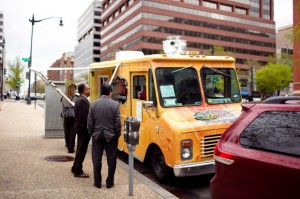Should D.C.’s food laws try to protect consumers and public safety? Or should they try to protect brick-and-mortar restaurants from competition?
D.C.’s restaurant lobbyists, along with many local politicians and bureaucrats, seem to think the government’s job is to save the delis and diners, bistros and brasseries from the scourge of falafel trucks, barbecue buses and weenie wagons.
Most of downtown D.C., according to the Food Truck Association of Metropolitan Washington, would be off-limits to food trucks under new regulations proposed by the Department of Consumer and Regulatory Affairs. The Golden Triangle would be sacred ground, not to be soiled by the unclean tires of mobile vendors, except for those fortunate few smiled upon by the whimsical gods of the DCRA.
The rules would designate a few food truck parking spots around prime locations such as George Washington University, Farragut Square and the Verizon Center. These spots would be awarded by lottery once a month to a handful of trucks, and all other trucks would be prohibited from coming within 500 feet of these zones. The proposed regs would also prohibit trucks from parking anywhere that lacks 10 feet of “unobstructed sidewalk.”
When I called Food Truck Association President Doug Povich for this column, he said, “I wish the story wasn’t ‘restaurants vs. food trucks.’ ” But it is.
The restaurant lobby hasn’t fully embraced DCRA’s proposed rules yet — the eateries want to ensure the rules are strict enough. Kathy Hollinger, president of the Restaurant Association Metropolitan Washington, wants a limit of two or three trucks on either side of a park, reports my Washington Examiner colleague Eric P. Newcomer.
Why should there be any limit — besides the number of legal parking spots — on how many trucks can line up on either side of Farragut Square? The clear reason is restraining competition. Jim Doherty, owner of the Washington Deli, said of food truck proliferation, “If they don’t stop it, they’re going to be everywhere. … There’s so little barrier to entry.”
Barriers to entry are a great way to protect incumbent businesses and thus allow for higher profit margins, but you wouldn’t think politicians would actually put value on protecting the restaurants from competition. In D.C., though, the politicians do.
D.C. Councilman Vincent Orange, chairman of the council’s Committee on Business, Consumer and Regulatory Affairs, says he is seeking middle ground between allowing entrepreneurship and protecting the existing guys: “Obviously, the restaurants have been here for a very long time. They’ve made a major investment in the city,” Orange told the Washington Examiner earlier this month. “At the same time, you don’t want to stand in the way of emerging businesses.”
Other cities are even more brazen in their restaurant protectionism. Chicago Alderman Tom Tunney — who owns a chain of restaurants — demanded a food truck law that “protects brick-and-mortar restaurants,” the Chicago Sun-Times reported. Tunney is the former chairman of the Illinois Restaurant Association, which has led the fight to restrict food trucks.
And Chicago’s restaurants, to date, have won.
Find the entire article by Tim Carny at the Washington Examiner <here>




